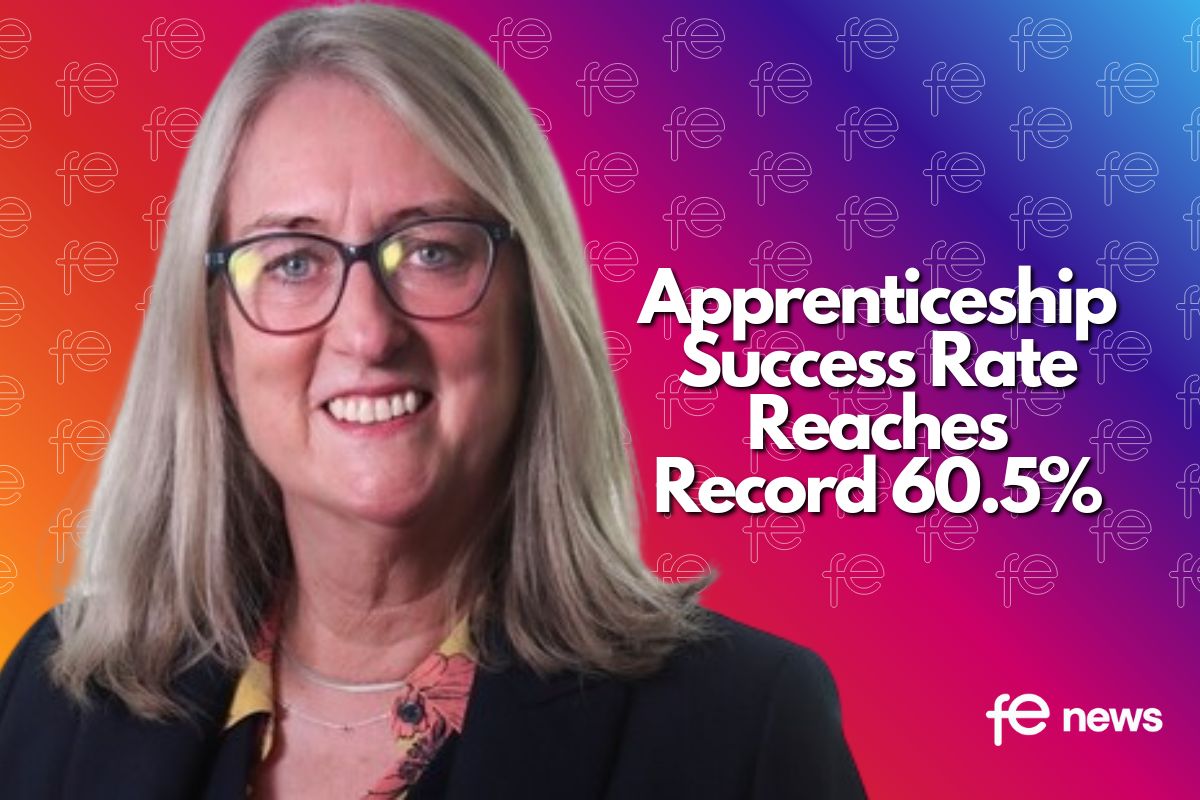Richard Pennycook CBE is announced as Interim Chair of Skills England – Sector Reaction

- Prime Minister Keir Starmer and Education Secretary Bridget Phillipson launched the new body to meet the skills needs of the next decade across all regions.
- Skills England is tasked with identifying current and future skills gaps and driving forward plans to enable young people and adults to develop the skills they need to seize opportunities.
- The new body brings together key partners to drive growth and break down barriers to opportunity. IfATE’s functions will transfer to Skills England, as part of the new organisation’s broader remit.
The Prime Minister and Education Secretary have announced the launch of Skills England to bring together the fractured skills landscape and create a shared national ambition to boost the nation’s skills.
[The Education Secretary has also today appointed Richard Pennycook CBE, former chief executive of the Co-operative Group and lead non-executive director at the DfE, as the interim Chair.]
Skills are crucial to economic growth, with a third of productivity improvement over the last two decades explained by improvements to skills levels.
But between 2017 and 2022 skills shortages in this country doubled to more than half a million, and now account for 36% of job vacancies.
Skills England will bring together central and local government, businesses, training providers and unions to meet the skills needs of the next decade across all regions, providing strategic oversight of the post-16 skills system aligned to the Government’s Industrial Strategy.
Supporting local areas to develop the skilled workforces they need – in particular across construction and healthcare – is fundamental to the Government’s mission to raise growth sustainably. By working with the Migration Advisory Committee, Skills England will also help reduce reliance on overseas workers.
Prime Minister Keir Starmer, said:
“Our skills system is in a mess, which is why we are transforming our approach to meet skills needs over the coming decades.
“They will help to deliver our number one mission as a government, to kickstart economic growth, by opening up new opportunities for young people and enabling British businesses to recruit more home-grown talent.
“From construction to IT, healthcare to engineering, our success as a country depends on delivering highly skilled workforces for the long-term. Skills England will put in place the framework needed to achieve that goal while reducing our reliance on workers from overseas”.
Education Secretary Bridget Phillipson said:
“Our first mission in government is to grow the economy, and for that we need to harness the talents of all our people to unlock growth and break down the barriers to opportunity.
“The skills system we inherited is fragmented and broken. Employers want to invest in their workers but for too long have been held back from accessing the training they need.
“Skills England will jumpstart young people’s careers and galvanise local economies. It will bring businesses together with trade unions, mayors, universities, colleges and training providers to give us a complete picture of skills gaps nationwide, boost growth in all corners of the country and give people the opportunity to get on in life.”
The organisation will identify the training for which the Growth and Skills Levy will be accessible – an important reform, giving businesses more flexibility to spend levy funds on training for the skills they need, which employers have long been calling for.
Skills England will be established in phases over the next 9-12 months to create a responsive and collaborative skills system.
The Skills England Bill announced this week will transfer functions from the Institute for Apprenticeships and Technical Education (IfATE) to Skills England.
This sits alongside work to simplify and devolve adult education budgets to Mayoral Combined Authorities to ensure that they can address their adult skills needs directly and support growth in their areas.
Who is Richard Pennycook?
Richard Pennycook CBE is the lead non-executive board member of the Department for Education. He joined DfE back in 2017. Pennycook was previously the CEO of Co-operative Group between March 2014 and February 2017, where he helped steer them into profit after the banking crisis in 2013. He won a lot of praise after he volunteered to reduce his basic salary from £1.25m to £750,000 whist at the Co-operative Group.
Richard Pennycook is chair of Howdens Joinery Group plc, 2 Sisters Food Group, and On the Beach plc. He is also co-chair of the Retail Sector Council. He has also held board roles at Morrison, RAC, Laura Ashley, J D Wetherspoon, and The Hut Group. Richard Pennycook was awarded his CBE in the 2020 Birthday Honour’s list for services to retail.
Next steps for establishing Skills England
- The first phase of Skills England’s launch involves setting up the organisation in shadow form within the DfE, and starting work on an assessment of future skills needs while building strong relationships with employers. A permanent board, Chair and CEO will be appointed in due course.
- Skills England will hold responsibility for maintaining a list of levy-eligible training to ensure value for money, and that the mix of government-funded training available to learners and employers aligns with the identified skills needs.
- The government will also bring forward a comprehensive strategy for post-16 education to break down barriers to opportunity, support the development of a skilled workforce, and drive economic growth through our industrial strategy.
What are the next steps and integration of IfATE into Skills England?
- The route for employers to shape skills training is currently offered by the Institute for Apprenticeships and Technical Education (IfATE). IfATE’s functions will transfer to Skills England, as part of the new organisation’s broader remit. IfATE will continue its important work in the interim as the transition of functions to Skills England is finalised.
Sector Reaction to the launch of Skills England
An IfATE spokesperson said:
“We look forward to working closely with DfE officials and Ministers to respond rapidly to the Government’s new priorities, dedicated to providing more opportunities to learners from all backgrounds and delivering outstanding skills for businesses of all shapes and sizes, right across the country.
“It is good to hear that the crucial role employers currently play will be at the heart of the future system.
“IfATE’s functions will pass to Skills England following the passage of the legislation. In the interim, it is important that our key stakeholders – employers, local areas, learners, providers, and awarding bodies – continue to work with us to ensure we have the apprenticeships and technical qualifications the country needs.”
David Hughes, Chief Executive, Association of Colleges (Aoc), said:
“I’m pleased to see that ministers are getting on so quickly in establishing Skills England. They are right to say that the post-16 education and skills system needs more focus and coordination, with better understanding of the priorities. A strong social partnership between government, employers, unions and education institutions will be able to stimulate demand for skills that will help people get better jobs and support the productivity improvements needed for economic growth.
“A shadow board can make a quick start, alongside the legislation to firmly place Skills England at the heart of the government’s drive for economic growth. It can deliver better national intelligence to support mayors to work with employers, unions, colleges, universities and training organisations to meet labour market needs and boost growth.
“Colleges are vital partners to Skills England and to delivering on the government’s missions. We will do all that we can to help Skills England make a strong start and establish itself over the coming months and years.”
Dr Vikki Smith, Executive Director of Education and Standards at Education and Training Foundation (ETF) said:
“We are delighted at the pace with which the Government has moved to establish Skills England, with its mission to support economic growth by harnessing the talents of the nation and breaking down barriers to opportunity.
“High quality teaching and learning is key to the delivery of the Government’s industrial strategy agenda. As a driver for economic growth, the strategy needs investment in the Further Education (FE) and Skills workforce guided towards quality education and training, so that those coming through the FE and Skills sector can deliver on the needs of the economy and industry.
“In Skills England, as a sector, we have a unique opportunity to support the change that the new government wants to bring while we build trust in our FE and Skills system. We look forward to working in partnership with Skill England towards a skills system that invests in its workforce while producing a pipeline of skilled individuals who will design, develop, and deliver sophisticated technology and high-quality products and services, enabling the UK to compete at the highest level. Productive work not only buoys our economy, but it also drives social mobility, helps build identity and self-esteem, thus promoting the wellbeing of whole communities.”
Dr Adeshola Cole, CEO of Tritek Consulting, said:
“Skills play a crucial role in all organisations so the Government’s focus on upskilling through Skills England is encouraging to see. As part of this launch, the Government should work closely with educators and industry to bridge the gap between the curriculum and the skills that employers need in the workplace, better equipping young people to transition into their first role. Areas such as AI and FinTech are moving quickly, requiring a new generation of digitally skilled people to oversee innovation and continue driving these sectors forward to fuel economic growth.”
The University and College Union (UCU) today (Monday) welcomed proposals for unions to be key stakeholders in boosting the nation’s skills. The union was responding to the government’s launch of Skills England.
UCU general secretary Jo Grady said:
“We welcome proposals for unions to provide strategic oversight of the post-16 skills system. Our members are the experts in skilling up students, and it is high time to reset relationships between government and educators.
“The government now needs to make sure there are enough college teachers in place to reskill England. At the moment, colleges face a recruitment crisis because teachers in further education earn £9k less than their counterparts in schools. Reskilling England will therefore require significant investment.”
Simon Ashworth, AELP Deputy CEO and Director of Policy, said:
“The Secretary of State for Education is spot on when she says growing the economy means harnessing the talents of all our people by breaking down the barriers to opportunity. But this rhetoric must be met by actions and outcomes. It’s clear that skills are at the heart of the government’s growth and opportunity missions, and we welcome that the government is keeping up the momentum by launching Skills England today.
The intent is there but we also need to get implementation right which will require strong foundations to be laid now to enable Skills England to flourish in the future. Skills England must see employers and providers being given a seat right at the heart of the organisation. After all, they are able to provide direct insight into what skills are needed and how the system can be improved – as well as ensuring government plans are deliverable in practice.
It is critical that Skills England doesn’t become institutionalised and works collaboratively with employers and providers as well as operating cross-departmentally throughout government to deliver the Prime Minister’s opportunity mission. Simply rebadging old institutions with a new name won’t be enough – this is a time to be ambitious.”
Dr Joe Marshall, Chief Executive of the National Centre for Universities and Business (NCUB), said:
“It’s no secret that the UK is facing a severe and acute skills crisis. Between 2017 and 2022 skills shortages in the nation doubled to more than half a million, and now account for 36% of job vacancies. What’s more worrying still is that businesses face barriers to upskilling their staff and accessing new talent. The new Government has wasted no time in taking action. We warmly welcome that Skills England, which will bring together business and training providers, is being launched today.”
Marshall concluded:
“A strong education system, matched to the talent needs of employers is what underpins a productive economy and drives opportunity. The collaborative nature of Skills England that has partnerships with employers at its heart, is particularly welcome. Businesses, as both customers of talent and drivers of evolving skill needs, must be central to this transformation.”
UCU general secretary Jo Grady said:
“We welcome proposals for unions to provide strategic oversight of the post-16 skills system. Our members are the experts in skilling up students, and it is high time to reset relationships between government and educators.
“The government now needs to make sure there are enough college teachers in place to reskill England. At the moment, colleges face a recruitment crisis because teachers in further education earn £9k less than their counterparts in schools. Reskilling England will therefore require significant investment.”
Stephen Evans, Chief Executive of Learning and Work Institute, said:
“It’s good to see the Government making progress with establishing Skills England and providing some more information on its role. The skills landscape in England is overly complex and fragmented. Skills England can play a role in bringing that together and ensuring skills are a core part of delivering national priorities such as clean energy and increased homebuilding. But we also need a simpler and more coherent system. We look forward to seeing the Government’s plans for simplification and an integrated post-18 system and Skills England’s role within it. I hope it will develop those in an open and collaborative way, drawing on the expertise of all those working in the learning and skills systems.”
Lizzie Crowley, skills adviser for the CIPD, Said:
“The creation of Skills England will be key to understanding the UK’s skills priorities and setting an overall strategy. Ensuring that we have the right skills, in the right place, at the right time is essential to unlocking UK-wide productivity and growth.
“There’s a clear and urgent need to connect and simplify the UK’s fragmented and complex skills landscape. The new agency must also join up policy across the Government’s industrial strategy, the migration advisory committee and local skills and growth priorities. This is no easy task. It’s a challenging road ahead but it’s vital that the Government sees this as a long-term project that can finally bring stability and certainty to the skills agenda.
“A key focus for Skills England must be on unlocking apprenticeship opportunities for young people and reversing the decline in take up among small businesses in recent years.
“When looking at the new Growth and Skills Levy it will be vital to consider how this will work in practice. The new levy must encourage employers to invest more in training that will address workforce skills gaps and shortages and boost apprenticeship opportunities for young people. Getting this balance right will be essential to reversing the collapse in employer investment in apprenticeships and training in recent years.”
Vice-Chancellor Professor Steven Spier, the founder of Kingston University, reacts to the launch of Skills England:
“As the leader of a university that has been actively championing the need for skills for innovation to drive a thriving national economy, I’m extremely encouraged to see the Government’s commitment to engaging with universities in the development of Skills England.
“Building skills today to deliver the jobs of tomorrow is one of the greatest challenges of our time. Higher education has a pivotal, but all too often overlooked, role to play in ensuring young people develop the skills businesses urgently need to secure economic growth in a rapidly evolving, digital first world.
“For Skills England to be truly transformational, it is vital universities, businesses and policymakers all work together to respond to this challenge. Universities need to be at the forefront of teaching students the skills they need for life. This is why, at Kingston University, we have been leading the way in the United Kingdom embedding core modules in Future Skills in every undergraduate course for every student alongside subject-specific learning. Only through approaches such as this can we truly unlock improved productivity and greater prosperity for the nation as a whole.”
Mark Hilton, Policy Delivery Director at BusinessLDN, said:
“The Prime Minister is right to stress the importance of partnership between government, industry and educators in developing a joined-up approach to skill development and migration policy. Skills England must work closely with the Migration Advisory Committee and businesses to ensure we are both upskilling UK workers effectively and attracting the top international talent we need to accelerate growth.
“More than a third of London firms report skills and capacity gaps within their workforce. That’s why we’ve led on crafting interventions to address those gaps in the London Local Skills Improvement Plan. Skills England should take these plans, which have been developed across the country, as its starting point for engagement.
“It was encouraging to hear Keir Starmer recognise the importance of allowing young people to earn and learn through apprenticeships. The apprenticeship levy system has been a continuous source of frustration for many employers since its introduction. We look forward to supporting the development of a new levy model which puts responsiveness and flexibility front and centre.”
Kirstie Donnelly MBE, Chief Executive Officer of City & Guilds, said,
“It is fantastic to see the new government is forming Skills England. The more coordinated and joined-up the skills and post-16 education system is, the greater the positive impact we can have on learners, organisations, and wider society.
“The progression of legislation in parallel with the creation of a shadow board should allow for quicker implementation into the machinery of national government, combined mayoral authorities, and industry. In turn this should help deliver on the government’s goals of prioritising economic growth.
“We look forward to working in partnership with Skills England to deliver both in the short and long term and I hope learn from mistakes of the past too.”
the Recruitment and Employment Confederation (REC) Director of Campaigns and Research Shazia Ejaz said:
“The urgency with which the new government is setting out plans to improve the ability for people to train up, and for employers to access the skills they are desperate for, is welcome. Employers have long wanted to see reform of the skills system. Skills England has an important job to improve upon the Apprenticeship Levy which failed to meet employer demands and where so much money paid in to the pot wasn’t used effectively. That is why businesses and especially recruiters who understand employer needs should now be central to advising the body on priority setting and the best approach to combatting labour shortages.
“The move to a more flexible Growth and Skills Levy where apprenticeships will not be the only option available for employers to spend their levy funds on will be a huge help for temporary workers. Not everyone works full-time or with the same employer for long periods, so training has to be accessible to people working flexibly. There are one million temporary workers on assignment on any given day, most of whom have been missing out on opportunities to train. Skills England must focus on redressing that. One way to do that is to allow the new Levy to fund modular courses in worker-short sectors.
“By working with the Migration Advisory Committee, Skills England can help reduce reliance on overseas workers. But public policy must find a balance between helping domestic talent to shine while accepting that takes time. So along with today’s announcement we want to hear more from the government on how they will create a fair and flexible immigration system to meet the needs of business. And we should remember that survey after survey shows people support immigration by those who are here to work, pay tax, and build a life. To maximise economic growth, we need a skills and immigration policy that work in sync to meet the needs of employers in the private and public sectors.”
Robert West Head of Education & Skills, CBI, Said:
The CBI has long called for the establishment of a national independent skills body to promote collaboration between stakeholders, and better align employment, education, and skills.
Any step to help simplify the skills system and provide flexibility will be welcomed by firms. Skills England is therefore a first step in the right direction.
Beyond the measures announced, firms are also keen to see greater interdepartmental coordination between government departments, to maximise efficiency of skills policies. The CBI stands ready to work alongside the Government to further simplify our skills system and help create a strong workforce equipped to deliver sustainable growth.
A spokesperson for Co-op said:
“We are pleased to congratulate Richard Pennycook on his appointment as interim chair of Skills England. Richard has a rich history in co-operative action and we look forward to working with him and Skills England to ensure that the skills system is responsive to the needs of employers and learners, and supports the recovery and resilience of our communities.
“The Co-op has always been committed to skills development and you can see that in the growth of our own apprenticeship programme, the Co-op Levy Share Service (which has facilitated more than 2,000 apprenticeships), as well as sponsorship of our own Multi Academy Trust which currently has 36 academies.
“We recognise the challenges and opportunities that the Department for Education faces in developing a new skills strategy and we welcome their swift and collaborative approach to this vital issue. We hope that Skills England will play a key role in shaping a skills system that is fit for the future and that reflects the values and principles of co-operation.”
Anthony Painter, Policy Director at the Chartered Management Institute (CMI), said:
“CMI welcomes the Prime Minister and Education Secretary’s plan to address the UK’s skills needs and boost the economy by creating opportunities for young people, and providing increased support for British businesses to recruit more home-grown talent.
“The UK skills gaps, including the significant shortage of skilled managers in our economy, will not be addressed without this concerted, longer term approach to upskilling our workforce at every age and stage of people’s working lives.
“Our research shows that quality standards-based training such as management apprenticeships deliver significant productivity gains and support social mobility. Seven out of 10 (71%) of management apprentices come from families where neither parent attended university and this level of upskilling is raising the performance of business and in our valued public services while driving economic growth and ensuring people have the skills they need in a changing workplace.We look forward to seeing Skills England established as the change agent that will significantly elevate the UK’s skills landscape.”
David Smith, CEO at Lifetime said:
“As one of the UK’s largest apprenticeship training providers, we welcome the new Labour government’s focus on investment into skills reform in the industry, and the establishment of Skills England.
“Reforming the apprenticeship levy has been a key ask of ours and will ensure that employers can use funds for a wider range of courses, including modular courses, to ensure a boost to skills across a range of industries.
“We look forward to collaborating with the new Labour government to ensure quality training programmes are rolled out across the UK and that apprentices are supported to thrive in their careers.
“The new government however must ensure that it consults with employers and training providers, to ensure the levy supports employers’ needs and provides opportunities for learners of all ages and skill level.”
Nichola Hay, Director of Apprenticeships Strategy and Policy, BPP said:
“Labour’s newly launched Skills England has been set up to coordinate business, training providers, unions and government, to ensure we build a highly trained workforce fit for the future. Key to that is the reform of the apprenticeship levy into a flexible Growth and Skills Levy. It’s good to see Labour have taken action early.
“Skills England, however, must be clearly defined in its role and ensure it is not a body without purpose that takes years to implement major decisions. Key stakeholders within the education space must be around the table when it is designed, with employers and training providers at the heart of decision making and its outcomes defined, to make sure it delivers for the entire skills ecosystem.
“While it is also welcome that Skills England is taking responsibility from IfATE, this can’t be a case of lift and shift, but should come with a reform of processes to improve them, not just changing the organisation.
“The work of IfATE can’t ground to a halt during this process. Skills England needs to also take caution when reviewing the flexible Growth and Skills levy to ensure apprenticeships are not displaced and employers have the flexibility to train, upskill and retain employees.
“Its launch also opens up a vital opportunity for this new Government to deliver a transformative National Skills Strategy, aligned with an Industrial Strategy, to ensure the UK has the skills it needs for a dynamic and growing economy. In doing so, we can ensure learners of all levels have the best possible outcomes.”











Responses